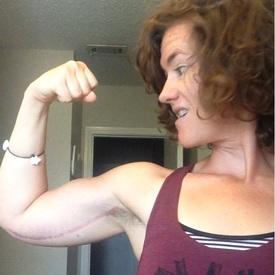How much is 'water weight'?
Options

oremus1
Posts: 100 Member
obviously it will vary from person to person, height, weight etc. but in general? some say about 2 lbs, others say the first 10lbs. i personally put on 5lbs in water weight in a day, lost it a couple days later, and have just pu on 2lbs water weight. how can we know if we are gaining o losing if water weight keeps adding or subtacting?
0
Replies
-
I hate water weight! My first 5-6ish pounds seemed to be water weight. You'll know it's just water if the scale goes up a pound or more over night and you were within your calories the days leading up to your weigh in. You don't gain fat over night. Also if you exercise really hard you can expect to retain water for a few days (maybe even a week). Keeping your sodium intake in check also helps reduce water weight.0
-
Generally you can tell if it is water weight by how fast it comes off (or comes on). I am 2 lbs heavier this morning than I was yesterday, that was water weight (very hard workout yesterday). If you lose say 6 lbs in a week 4 or 5 would be water weight loss and the other 1 or 2 would be fat.0
-
Generally you can tell if it is water weight by how fast it comes off (or comes on). I am 2 lbs heavier this morning than I was yesterday, that was water weight (very hard workout yesterday). If you lose say 6 lbs in a week 4 or 5 would be water weight loss and the other 1 or 2 would be fat.
Yes, but once you're a month or so into this, unless you suddenly change to a low-sodium diet after having been eating high-sodium from the outset, or if you had started a higher intensity exercise right BEFORE your initial weigh-in and now are backing off, any water loss in one week is water you put on in a previous week (due to more intense exercise, an increase in sodium, monthly cycle, etc.), so in the earlier week water gain was masking fat loss.
From the OP's ticker and start date, it looks like you're at the early part of the journey, but once you get a little further along you'll probably see it's not a straight-line process. Just keep comparing where you are to your start weight, and divide the loss by the number of weeks you've been on your new path, and say, "OK, I've been averaging 1.5 lbs a week," or whatever. Don't get too hung up on the week to week. There are always things that are going to cause you to gain the same 3-5 lbs (or however much it is for you) of water over and over again.
Also, it's a little silly and maybe even a little obsessive, IMO, to cut sodium for the sole purpose of reducing water weight (that is, to try to achieve a particular number on the scale). You'll likely just make the sodium-related swings even bigger when you do have a meal in a restaurant or someone else's home. If you look at your food diary and realize that the calories and fat from an ounce of potato chips (or whatever your salty snack of choice is) will fit in your goals today, do you want to have to say no only because the sodium will cause you to retain water? I think it's better just to learn to accept that water weight and water loss happens and to look at the longer-term trends. The first week that I didn't lose anything, I managed to keep pretty calm about it and tell myself it was a water weight issue (although I did increase my exercise goals a little, but I really needed to do that anyway for fitness), and in the next couple of weeks the scale went down faster when the water dropped off and stopped masking the fat loss from that week. When the same thing happened at the same point in my next cycle, I didn't worry or change anything, and sure enough, the scale went down faster in the next two weeks again.
Also remember that the food and liquids you take in weigh something, even water -- in fact, water is pretty heavy/dense -- so until it passes out of your body, it registers on the scale. Try to weigh yourself at the same time every week, to minimize those variations. It's usually easiest to do that by weighing in the morning after emptying your bladder and (if possible) moving your bowels, and before you eat anything. (Some people argue for daily weigh-ins, or even more often,which is fine if you're able to look at all those data points and treat them as defining an overall trend, but my impression is that most people are more likely to invest too much meaning into each weigh-in and think that a four pound gain from 8 a.m. to 8 p.m. is indicative of an overall trend of weight gain.)0
This discussion has been closed.
Categories
- All Categories
- 1.4M Health, Wellness and Goals
- 396.7K Introduce Yourself
- 44.2K Getting Started
- 260.8K Health and Weight Loss
- 176.3K Food and Nutrition
- 47.6K Recipes
- 232.8K Fitness and Exercise
- 450 Sleep, Mindfulness and Overall Wellness
- 6.5K Goal: Maintaining Weight
- 8.7K Goal: Gaining Weight and Body Building
- 153.3K Motivation and Support
- 8.3K Challenges
- 1.3K Debate Club
- 96.5K Chit-Chat
- 2.6K Fun and Games
- 4.5K MyFitnessPal Information
- 16 News and Announcements
- 18 MyFitnessPal Academy
- 1.4K Feature Suggestions and Ideas
- 3.1K MyFitnessPal Tech Support Questions


